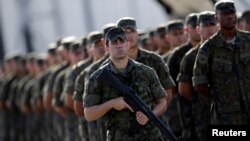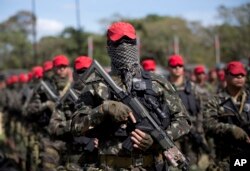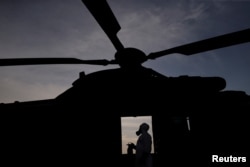Brazil will step up security cordons, add further roadblocks and frisk more visitors in Rio de Janeiro for next month's Olympic Games to increase security after the truck massacre in France, the government said on Friday.
Already on guard because of recent attacks in Paris, Brussels and Orlando, Brazilian officials met to re-assess preparations for the Games, which start Aug 5 and are expected to attract as many as 500,000 foreign visitors.
Authorities had earlier decreed holidays and banned trucks in some areas of the sprawling city for peak periods of the Olympics to ease congestion and improve emergency response capabilities.
Officials said on Friday they would also increase the number of security perimeters, spot-checks of visitors and roadblocks across Rio.
Because of longer lines and more inspections for those attending events, the enhanced measures "may mean sacrificing comfort for the sake of security," said Sergio Etchegoyen, Brazil's minister of institutional security.
Overall, though, Brazil on Friday sought to reaffirm the security plan it has been developing in recent years, along with foreign partners.
"Brazil is confident about its preparations," Sports Minister Leonardo Picciani told Reuters. "Personnel are ready, all the protocols have been followed and we are employing the most modern security and defense techniques."
In addition to a deployment of about 85,000 police, soldiers and other security personnel, over the twice the size of the force used at the London Olympics in 2012, Brazil has been cooperating with foreign intelligence services and militaries to share information, tactics and strategy.
It is not yet clear whether Thursday's killings in the French city of Nice had any connection to a militant group or was the solitary work of the lone attacker, a 31-year-old Tunisian living in France who was killed by police.
But the latter scenario, involving a so-called "lone wolf," is the sort of attack that security officials say is most worrisome because known networks are easier to track than random people.
On Friday, state police officials in Rio were conducting security drills, including a simulation of the detention of a terrorist involving a helicopter and a SWAT team. The drill follows other police and military exercises simulating bomb and chemical attacks and a marine scenario.
"No effort is being spared," Defense Minister Raul Jungmann told the Globo television network Friday morning, highlighting the training and the increased level of cooperation in recent months with foreign governments and intelligence agencies.
A joint security center during the Olympics will operate with police representatives from dozens of countries and a separate intelligence center has been set up to include officials from the United States, France, Britain, Spain and other partners.
So far, Brazilian and foreign officials say they are not aware of any credible threat to the Games in terms of intelligence "chatter."
Still, the recent attacks, and unconfirmed talk of plots against the Rio Games have heightened concerns, especially in a chaotic metropolis where police even on normal days face serious logistical, financial and operational hurdles against violent crime.
According to a transcript of a parliamentary hearing released this week in France, a French military official in May said a foreign government had advised of a possible attack against the French Olympic delegation. Brazilian officials, however, said they were unaware of any such plot.







